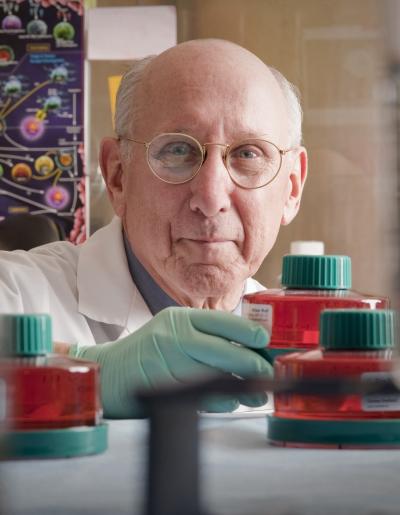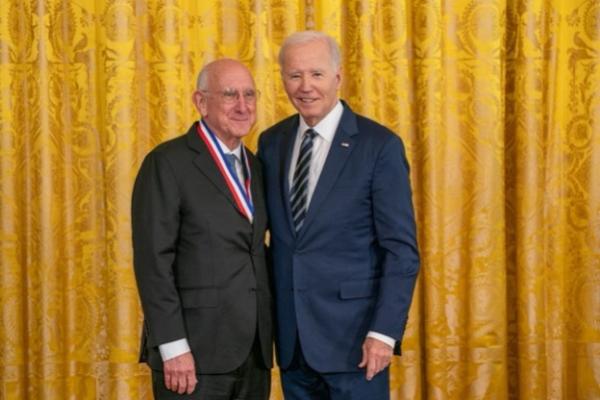Celebrating 50 Years of Cancer Immunotherapy Research
Symposium Marks Half Century of Steven Rosenberg’s Research Discoveries, Mentorship
BY JOHN CARLO J. COMBISTA, NIMH

CREDIT: RHODA BAER, NCI
Rosenberg marks 50 years of scientific discoveries in cancer immunotherapy. Join the celebration at the Sept. 26–27 symposium hosted in his honor: “Past, Present, and Future of Cellular Immunotherapy: Scientific Symposium Celebrating Steven A. Rosenberg’s 50 Years at NCI.”
It was 50 years ago, in 1974, when Steven Rosenberg came to NIH as Surgery Branch chief at NCI to spearhead the use of multimodality treatments in surgical oncology and a new field of cancer research: cellular immunotherapy.
Cellular immunotherapy can be traced back to when Rosenberg encountered two patients at Peter Bent Brigham Hospital in Boston during his surgical residency training whose metastatic cancers disappeared under unusual circumstances. He surmised that the remarkable regressions might have been due to the patients’ own immune response. Since, Rosenberg has become known as the father of cancer immunotherapy because under his leadership and mentorship, he and his teams of collaborators’ decades of work have led to the use of immunotherapy for the treatment of cancer. In one such example earlier this year, the FDA approved lifileucel (Amtagvi) for the widespread use of tumor-infiltrating lymphocytes (TIL) for the treatment of melanoma.
To mark 50 years of immunotherapy at the NIH, NCI’s Center of Excellence in Immunology will host a symposium on September 26 and 27 at Masur Auditorium, Building 10, on the Bethesda campus. Titled “Past, Present, and Future of Cellular Immunotherapy: Scientific Symposium Celebrating Steven A. Rosenberg’s 50 Years at NCI,” the event will comprise scientific presentations from experts in the field who will share their research with the aim of catalyzing the next 50 years of cellular immunotherapies.
“We are going to be talking about the major topics in modern immunology related to the role of the immune system in the response to cancer and the principles that guide the development of new cancer immunotherapies,” said Rosenberg. “We have many of the world’s experts in this field presenting their work concentrating on the use of cellular approaches to cancer therapy and presenting the best of new information that can help propel the field forward.”
Joining Rosenberg as committee co-chair for the symposium is Stephanie Goff, senior research physician at the Surgery Branch. Goff is a surgical oncologist who was mentored by Rosenberg for four years in between her surgical residency and her return to the Surgery Branch 10 years ago to continue the work there.
“Dr. Rosenberg really wanted to focus on the science of what he has been able to accomplish,” Goff said. “So we designed the symposium to have a session that will briefly focus on the initial studies, where we are now, and where we are looking to [for] the future to make cellular therapy better for patients with cancer. We have a phenomenal lineup of speakers, most of whom either trained in the Surgery Branch or collaborated with the Surgery Branch in very important ways. We are looking forward to the program.”
Goff will be speaking in the first session about the origins of TIL and highlighting their 20-year effort to get that therapy across the finish line of FDA approval. Other luminaries in the field to present include the 2018 Nobel Laureate in Physiology or Medicine James “Jim” Allison from MD Anderson Cancer Center (Houston), who developed a cancer therapy based on inhibition of negative immune regulation, and James Kochenderfer, a senior investigator at NCI who was instrumental in developing the first chimeric antigen receptor T cells to be used to treat lymphomas.

CREDIT: RYAN MORRIS, NATIONAL SCIENCE & TECHNOLOGY MEDALS FOUNDATION
Rosenberg has been awarded several accolades for his work over the years. One of them was the National Medal of Technology and Innovation in Medicine, the nation’s highest honor for technological achievement, awarded by President Joseph Biden in a ceremony at the White House on Oct. 24, 2023.
Symposium attendees also can look forward to poster sessions and dedicated time after each speaker to help facilitate further discussion.
“This is a great opportunity to celebrate what we do as medical scientists,” said NCI Director Kimryn Rathmell. “The thrilling discoveries that took place over these last 50 years are nothing short of brilliant. Dr. Rosenberg, his team, and the patients who participated along the way all deserve the chance to be celebrated. It is a great opportunity to see what we can do as dedicated scientific teams and preview what is possible in the future.”
“I think the field of cancer, immunology, and immunotherapy has grown dramatically over the course of these many decades, and in my view, we’re just getting started in learning how to apply immune principles to cancer treatment,” said Rosenberg. “We need to work hard, know a lot, and collaborate to incorporate the best of all ideas in our research. I expect to see substantial progress in the future. I think that immunotherapy is one of the new areas that has the greatest potential for making progress in cancer treatment.”
Watch this video to learn about Rosenberg’s scientific career and his many achievements.
Want to learn more about those two patients at Peter Bent Brigham Hospital whose metastatic cancer disappeared? Register to attend “Past, Present, and Future of Cellular Immunotherapy: Scientific Symposium Celebrating Steven A. Rosenberg’s 50 Years at NCI.” Registration deadline is September 12.

John Carlo Jadormeo Combista is a predoctoral fellow in the NIMH Oligodendroglial Interactions Group under the supervision of Tobias Merson. He is interested in understanding how the brain develops and functions by exploring how patterns of myelination within specific neural circuits emerge. Outside of academia and writing, he is passionate about singing and volunteers his free time to work with vulnerable populations.
Rosenberg, who was elected to the National Academy of Sciences in 2024, will provide an overview of his career in a lecture on Wednesday, November 13, as part of the annual NIH NAS mini-symposium. Each year the NIH hosts such lectures by those elected to the NAS. Rosenberg will be joined by NCI’s Sandra Wolin, also newly elected. Note: This is part two of the 2024 NAS mini-symposium; three other NIH PIs” Thomas Kunkel (NIEHS), Kyung Kwon-Chung (NIAID), and Giorgio Trinchieri (NCI), will speak on September 24.
This page was last updated on Thursday, December 5, 2024
